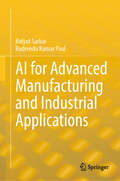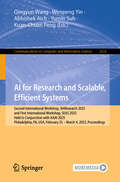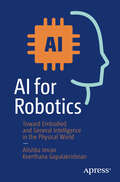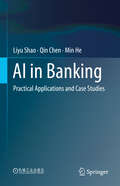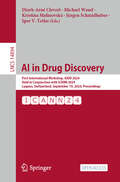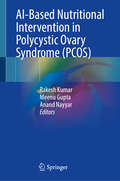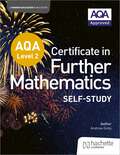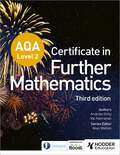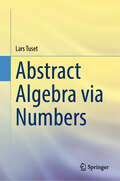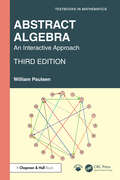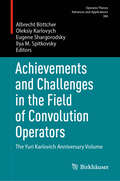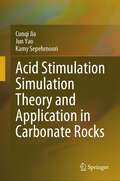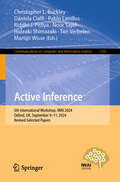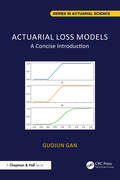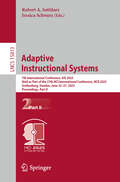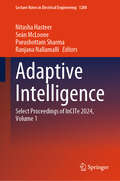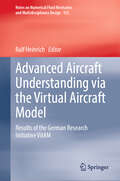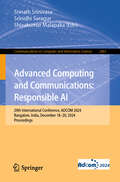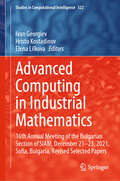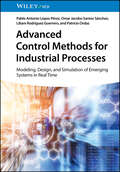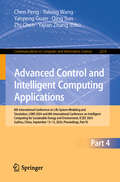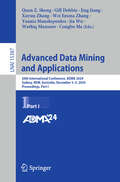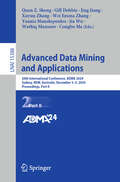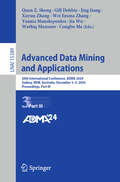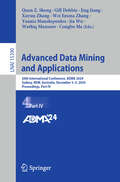- Table View
- List View
AI for Advanced Manufacturing and Industrial Applications
by Bidyut Sarkar Rudrendu Kumar PaulThis book provides a deep dive into the applications of Artificial Intelligence (AI) in advanced manufacturing and intelligent autonomous systems. Through real-world use cases and cutting-edge insights, it examines how AI, machine learning, IoT, and Industry 5.0 are revolutionizing manufacturing processes from end to end. Discover how integrating AI technologies with data analytics and IoT can unlock smarter, more efficient, and adaptable manufacturing solutions. Learn how predictive algorithms can foresee equipment failures, optimize inventory in real time, and enable autonomous robots to handle complex tasks, from assembly to logistics. With these innovations, manufacturers can achieve new levels of productivity, drive innovation, and create future-ready business models. Designed for industry practitioners, decision-makers, and aspiring professionals, this comprehensive guide offers actionable strategies and practical insights for implementing AI in advanced manufacturing. Whether you&’re a leader seeking to modernize operations or a graduate student aiming to enter this dynamic field, this book will empower you to navigate and leverage the next frontier of industrial innovation.
AI for Research and Scalable, Efficient Systems: Second International Workshop, AI4Research 2025, and First International Workshop, SEAS 2025, Held in Conjunction with AAAI 2025, Philadelphia, PA, USA, February 25–March 4, 2025, Proceedings (Communications in Computer and Information Science #2533)
by Kuan-Chuan Peng Wenpeng Yin Qingyun Wang Abhishek Aich Yumin SuhThis book constitutes the proceedings of the Second International Workshop, AI4Research 2025, and First International Workshop, SEAS 2025, which were held in conjunction with AAAI 2025, Philadelphia, PA, USA, during February 25–March 4, 2025. AI4Research 2025 presented 8 full papers from 35 submissions. The papers covered diverse areas such as agent debate evaluation, taxonomy expansion, hypothesis generation, AI4Research benchmarks, caption generation, drug discovery, and financial auditing. SEAS 2025 accepted 7 full papers from 17 submissions. These papers explore the efficiency and scalability of AI models.
AI for Robotics: Toward Embodied and General Intelligence in the Physical World
by Alishba Imran Keerthana GopalakrishnanThis book approaches robotics from a deep learning perspective. Artificial intelligence (AI) has transformed many fields, including robotics. This book shows you how to reimagine decades-old robotics problems as AI problems and is a handbook for solving problems using modern techniques in an era of large foundation models. The book begins with an introduction to general-purpose robotics, how robots are modeled, and how physical intelligence relates to the movement of building artificial general intelligence, while giving you an overview of the current state of the field, its challenges, and where we are headed. The first half of this book delves into defining what the problems in robotics are, how to frame them as AI problems, and the details of how to solve them using modern AI techniques. First, we look at robot perception and sensing to understand how robots perceive their environment, and discuss convolutional networks and vision transformers to solve robotics problems such as segmentation, classification, and detection in two and three dimensions. The book then details how to apply large language and multimodal models for robotics, and how to adapt them to solve reasoning and robot control. Simulation, localization, and mapping and navigation are framed as deep learning problems and discussed with recent research. Lastly, the first part of this book discusses reinforcement learning and control and how robots learn via trial and error and self-play. The second part of this book is concerned with applications of robotics in specialized contexts. You will develop full stack knowledge by applying the techniques discussed in the first part to real-world use cases. Individual chapters discuss the details of building robots for self-driving, industrial manipulation, and humanoid robots. For each application, you will learn how to design these systems, the prevalent algorithms in research and industry, and how to assess trade-offs for performance and reliability. The book concludes with thoughts on operations, infrastructure, and safety for data-driven robotics, and outlooks for the future of robotics and machine learning. In summary, this book offers insights into cutting-edge machine learning techniques applied in robotics, along with the challenges encountered during their implementation and practical strategies for overcoming them. What You Will Learn Explore ML applications in robotics, covering perception, control, localization, planning, and end-to-end learning Delve into system design, and algorithmic and hardware considerations for building efficient ML-integrated robotics systems Discover robotics applications in self-driving, manufacturing, and humanoids and their practical implementations Understand how machine learning and robotics benefit current research and organizations Who This Book Is For Software and AI engineers eager to learn about robotics, seasoned robotics and mechanical engineers looking to stay at the cutting edge by integrating modern AI, and investors, executives or decision makers seeking insights into this dynamic field
AI in Banking: Practical Applications and Case Studies
by Min He Liyu Shao Qin ChenBig data and artificial intelligence (AI) cannot remain limited to academic theoretical research. It is crucial to utilize them in practical business scenarios, enabling cutting-edge technology to generate tangible value. This book delves into the application of AI from theory to practice, offering detailed insights into AI project design and code implementation across eleven business scenarios in four major sectors: retail banking, e-banking, bank credit, and tech operations. It provides hands-on examples of various technologies, including automatic machine learning, integrated learning, graph computation, recommendation systems, causal inference, generative adversarial networks, supervised learning, unsupervised learning, computer vision, reinforcement learning, fuzzy control, automatic control, speech recognition, semantic understanding, Bayesian networks, edge computing, and more. This book stands as a rare and practical guide to AI projects in the banking industry. By avoiding complex mathematical formulas and theoretical analyses, it uses plain language to illustrate how to apply AI technology in commercial banking business scenarios. With its strong readability and practical approach, this book enables readers to swiftly develop their own AI projects.
AI in Drug Discovery: First International Workshop, AIDD 2024, Held in Conjunction with ICANN 2024, Lugano, Switzerland, September 19, 2024, Proceedings (Lecture Notes in Computer Science #14894)
by Igor V. Tetko Jürgen Schmidhuber Michael Wand Kristína Malinovská Djork-Arné ClevertThis open Access book constitutes the refereed proceedings of the First International Workshop on AI in Drug Discovery, AIDD 2024, held as a part of the 33rd International Conference on Artificial Neural Networks, ICANN 2024, in Lugano, Switzerland, on September 19, 2024. The 12 papers presented here were carefully reviewed and selected for these open access proceedings. These papers focus on various aspects of the rapidly evolving field of Artificial Intelligence (AI)-driven drug discovery in chemistry, including Big Data and advanced Machine Learning, eXplainable AI (XAI), Chemoinformatics, Use of deep learning to predict molecular properties, Modeling and prediction of chemical reaction data and Generative models.
AI-Based Nutritional Intervention in Polycystic Ovary Syndrome (PCOS)
by Rakesh Kumar Anand Nayyar Meenu GuptaThis book provides an overview of AI-powered nutritional interventions for the management of Polycystic Ovary Syndrome (PCOS). It focuses on AI-driven diagnostics for swift and accurate PCOS identification, personalized nutrition plans integrating genetic and hormonal data, and behavioral interventions promoting adherence. The book bridges the gap between technological innovation and clinical practice, leading to a new era of precision medicine in women's health. Chapters cover information from AI-tailored nutrition plans to suit individual PCOS profiles to insights into micronutrients, macronutrients, and dietary choices. They also address glycemic control, hormonal balance, and holistic wellness. Further chapters cover the ethical dimensions of AI in healthcare while championing patient empowerment. It also provides real-time monitoring through wearable tech and ethical considerations surrounding AI implementation in healthcare. The book includes real-life success stories, case studies, and practical guidance to aid decision-making. The book is relevant for healthcare professionals, gynecologists, nutritionists, and researchers to harness artificial intelligence’s potential in optimizing women's health and well-being.
AQA Level 2 Certificate in Further Mathematics (1st edition) Self-Study eBook
by Andrew GintyProvide your students with the tools they need to succeed in the AQA Level 2 Certificate in Further Mathematics with this focused and flexible self-study resource. Designed to complement classroom teaching, this concise eBook focuses exclusively on the "above GCSE" topics, making it the perfect solution for students studying independently or with limited teacher input.- Clearly identifies and covers only the "beyond GCSE" topics, ensuring students focus their independent study on the areas that require additional attention.- Includes 24 diagnostic tests (10 questions each) to help students assess their understanding and identify areas for improvement, reducing the need for teachers to create additional resources.- Independent chapters allow students to study topics in any order, complementing your classroom teaching without disrupting the GCSE curriculum.- Provides additional content to deepen understanding and support a smooth transition to A-Level Mathematics.- Links to Integral resources and interactive diagnostic quizzes enhance student engagement and understanding.
AQA Level 2 Certificate in Further Mathematics (3rd edition)
by David Pritchard Val Hanrahan Andrew GintyStretch and challenge students with the 3rd edition of this introduction to higher level mathematics. Plenty of practice activities, worked solutions and exercise questions help students to master the mathematical reasoning skills they need to succeed and prepare for the transition from GCSE to A-level.- Build understanding of mathematics with discussion points, thought-provoking activities and rigorous exercise questions.- Develop problem-solving skills and learn to use mathematical arguments with step-by-step worked examples.- Be mindful of possible misunderstandings; common pitfalls are noted throughout the text.- Check knowledge and understanding with a topic checklist of key points and learning objectives at the end of each chapter.- Embed understanding with free online access to narrated step-by-step examples on the Hachette Learning website.- Helps students to achieve their potential with two practice papers.
Abstract Algebra via Numbers
by Lars TusetThis book is a concise, self-contained treatise on abstract algebra with an introduction to number theory, where students normally encounter rigorous mathematics for the first time. The authors build up things slowly, by explaining the importance of proofs. Number theory with its focus on prime numbers is then bridged via complex numbers and linear algebra, to the standard concepts of a course in abstract algebra, namely groups, representations, rings, and modules. The interplay between these notions becomes evident in the various topics studied. Galois theory connects field extensions with automorphism groups. The group algebra ties group representations with modules over rings, also at the level of induced representations. Quadratic reciprocity occurs in the study of Fourier analysis over finite fields. Jordan decomposition of matrices is obtained by decomposition of modules over PID’s of complex polynomials. This latter example is just one of many stunning generalizations of the fundamental theorem of arithmetic, which in its various guises penetrates abstract algebra and figures multiple times in the extensive final chapter on modules.
Abstract Algebra: An Interactive Approach (Textbooks in Mathematics)
by William PaulsenAbstract Algebra: An Interactive Approach, Third Edition is a new concept in learning modern algebra. Although all the expected topics are covered thoroughly and in the most popular order, the text offers much flexibility. Perhaps more significantly, the book gives professors and students the option of including technology in their courses. Each chapter in the textbook has a corresponding interactive Mathematica notebook and an interactive SageMath workbook that can be used in either the classroom or outside the classroom. Students will be able to visualize the important abstract concepts, such as groups and rings (by displaying multiplication tables), homomorphisms (by showing a line graph between two groups), and permutations. This, in turn, allows the students to learn these difficult concepts much more quickly and obtain a firmer grasp than with a traditional textbook. Thus, the colorful diagrams produced by Mathematica give added value to the students. Teachers can run the Mathematica or SageMath notebooks in the classroom in order to have their students visualize the dynamics of groups and rings. Students have the option of running the notebooks at home, and experiment with different groups or rings. Some of the exercises require technology, but most are of the standard type with various difficulty levels.The third edition is meant to be used in an undergraduate, single-semester course, reducing the breadth of coverage, size, and cost of the previous editions. Additional changes include: Binary operators are now in an independent section. The extended Euclidean algorithm is included. Many more homework problems are added to some sections. Mathematical induction is moved to Section 1.2. Despite the emphasis on additional software, the text is not short on rigor. All of the classical proofs are included, although some of the harder proofs can be shortened by using technology.
Achievements and Challenges in the Field of Convolution Operators: The Yuri Karlovich Anniversary Volume (Operator Theory: Advances and Applications #306)
by Eugene Shargorodsky Albrecht Böttcher Ilya M. Spitkovsky Oleksiy KarlovychThis volume, which is dedicated to Yuri Karlovich on the occasion of his 75th birthday, includes biographical material, personal reminiscences, and carefully selected papers. The contributions constituting the core of this volume are written by mathematicians who have collaborated with Yuri or have been influenced by his vast mathematical work. They are devoted to topics of Yuri Karlovich's work for five decades, starting with his work on singular integral operators with shift, then broadened to include Toeplitz, Wiener-Hopf, Fourier and Mellin convolution and pseudodifferential operators, factorisation of almost periodic matrix functions, and local trajectory methods for the study of algebras of convolution and singular integral operators.
Acid Stimulation Simulation Theory and Application in Carbonate Rocks
by Jun Yao Cunqi Jia Kamy SepehrnooriThis book provides a theoretical basis and technical support for carbonate acid stimulation design. Carbonate reservoirs are one of the most important sources of fossil fuels. Acid stimulation is an effective technique for enhancing reservoir performance and boosting production. The book stands as a fundamental guide in implementing acid stimulation techniques in carbonate reservoirs. It models the acid stimulation process, contemplating mass, momentum, and energy changes alongside the real mineral composition of the carbonate rock matrix. Comprehensive sensitivity studies are conducted to elucidate the targeted mechanisms and optimization principles for designing acid stimulation applications in carbonate reservoirs. This book also serves as an excellent foundation for numerical simulation, providing detailed descriptions of how finite volume methods and sequential decoupling algorithms are utilized for numerical discretization and solving decoupled solutions on staggered grids. This book is an essential reference for reservoir engineers, academics, and students interested in studying and performing acid stimulation in carbonate reservoirs. It also helps readers obtain an understanding of modeling reactive flow in porous media with coupling multi-physical fields, including hydrologic–chemical-thermal processes and multi-scale characteristics. In addition, this book also delves into scale-up methods, such as the fundamental theoretical foundations and important theorems of the volume averaging approach. The book is used as a textbook for senior undergraduate and graduate courses in petroleum engineering.
Active Inference: 5th International Workshop, IWAI 2024, Oxford, UK, September 9–11, 2024, Revised Selected Papers (Communications in Computer and Information Science #2193)
by Tim Verbelen Pablo Lanillos Christopher L. Buckley Daniela Cialfi Noor Sajid Hideaki Shimazaki Martijn Wisse Riddhi J. PitliyaThis book constitutes the revised selected papers of the 5th International Workshop on Active Inference, IWAI 2024, held in Oxford, UK, during September 9–11, 2024. The 17 full papers included in this book were carefully reviewed and selected from 54 submissions. They were organized in topical sections as follows: Modeling Behaviour and Emotions; Hybrid Continuous-discrete Systems; Structure Learning; Multi-agent Systems; Epistemic Sampling; Robot Control; and Sustainability and Contextuality.
Actuarial Loss Models: A Concise Introduction (Chapman & Hall/CRC Series in Actuarial Science)
by Guojun GanActuarial loss models are statistical models used by insurance companies to estimate the frequency and severity of future losses, set premiums, and reserve funds to cover potential claims. Actuarial loss models are a subject in actuarial mathematics that focus on the pricing and reserving for short-term coverages.This is a concise textbook written for undergraduate students majoring in actuarial science who wish to learn the basics of actuarial loss models. This book can be used as a textbook for a one-semester course on actuarial loss models. The prerequisite for this book is a first course on calculus. The reader is supposed to be familiar with differentiation and integration.This book covers part of the learning outcomes of the Fundamentals of Actuarial Mathematics (FAM) exam and the Advanced Short-Term Actuarial Mathematics (ASTAM) exam administered by the Society of Actuaries. It can be used by actuarial students and practitioners who prepare for the aforementioned actuarial exams.Key Features: Review core concepts in probability theory. Cover important topics in actuarial loss models. Include worked examples. Provide both theoretical and numerical exercises. Include solutions of selected exercises.
Adaptive Instructional Systems: 7th International Conference, AIS 2025, Held as Part of the 27th HCI International Conference, HCII 2025, Gothenburg, Sweden, June 22–27, 2025, Proceedings, Part II (Lecture Notes in Computer Science #15813)
by Jessica Schwarz Robert A. SottilareThe two-volume set LNCS 15812-15813 constitutes the thoroughly refereed proceedings of the 7th International Conference on Adaptive Instructional Systems, AIS 2025, held as part of the 27th HCI International Conference on Human-Computer Interaction, HCII 2025, which took place in Gothenburg, Sweden, in June 2025. The total of 1430 papers and 355 posters included in the HCII 2025 proceedings was carefully reviewed and selected from 7972 submissions. The two volumes cover topics as follows: Part I: Adaptive Training and Education; Cognitive Modeling of Adaptive Instructional Systems; Part II: Adaptive and Personalized Learning; Emerging Technologies in Adaptive Instruction.
Adaptive Intelligence: Select Proceedings of InCITe 2024, Volume 1 (Lecture Notes in Electrical Engineering #1280)
by Seán McLoone Nitasha Hasteer Purushottam Sharma Ranjana NallamalliThis book comprises the select peer-reviewed proceedings of the 4th International Conference on Information Technology (InCITe-2024). It aims to provide a comprehensive knowledge base encompassing state-of-the-art research and development in adaptive intelligence, decision intelligence, artificial intelligence, deep learning, machine learning, data science, and enabling technologies for IoT, blockchain, and other futuristic technologies. It covers various topics that span cutting-edge, collaborative technologies and areas of computation. The content would serve as a rich knowledge repository on information & communication technologies, neural networks, fuzzy systems, natural language processing, data mining & warehousing, big data analytics, cloud computing, social networks, and intelligence, decision-making, and modeling, information systems, IT architectures, and security related aspects. This book provides a valuable resource for those in academia and industry.
Advanced Aircraft Understanding via the Virtual Aircraft Model: Results of the German Research Initiative VitAM (Notes on Numerical Fluid Mechanics and Multidisciplinary Design #155)
by Ralf HeinrichThis book reports on the results of a four-year collaborative project between the German Aerospace Center (DLR), three German universities and the aircraft industry. The project was funded by the Ministry for Economic Affairs and Climate Action. In the book, different subprojects are presented, with their corresponding case studies. Readers will find extensive information on simulation strategies required for virtual flight testing, and verification and validation aspects. All in all, this book offers a timely update on the state-of-the-art in flow simulation techniques, flight mechanics methods, integrated multidisciplinary simulation, reduced-order models, and on the development of processes for automated generation of aerodynamic databases. It addresses both researchers and professionals in the field of aviation engineering.
Advanced Computing and Communications: 29th International Conference, ADCOM 2024, Bangalore, India, December 18–20, 2024, Proceedings (Communications in Computer and Information Science #2461)
by Srinath Srinivasa Srinidhi Saragur Shivakumar MalapakaThis book constitutes the refereed proceedings of the 29th International Conference on Advanced Computing and Communications, ADCOM 2024, held in Bangalore, India, during December 18–20, 2024. The 21 full papers and 9 short papers presented here were thoroughly reviewed and selected from 79 submissions. These papers focus on the recent research trends and developments in the field of Computational and Communications engineering.
Advanced Computing in Industrial Mathematics: 16th Annual Meeting of the Bulgarian Section of SIAM, December 21–23, 2021, Sofia, Bulgaria, Revised Selected Papers (Studies in Computational Intelligence #522)
by Ivan Georgiev Hristo Kostadinov Elena LilkovaThis book gathers the peer-reviewed proceedings of the 16th Annual Meeting of the Bulgarian Section of the Society for Industrial and Applied Mathematics, BGSIAM'21, held in Sofia, Bulgaria. The general theme of BGSIAM'21 was industrial and applied mathematics with particular focus on: mathematical physics, numerical analysis, high performance computing, optimization and control, mathematical biology, stochastic modeling, machine learning, digitization and imaging, advanced computing in environmental, biomedical and engineering applications.
Advanced Control Methods for Industrial Processes: Modeling, Design, and Simulation of Emerging Systems in Real Time
by Pablo A. López-Pérez Omar Jacobo Santos Sánchez Liliam Rodríguez Guerrero Patricio OrdazA detailed introduction to mathematical models for new and established control engineers Control engineering is a system that helps us understand electrical, physical, chemical, and biochemical systems through the use of mathematical modeling, using inputs, outputs, and simulations. These experimental platforms are implemented in most systems of modern advanced control engineering. Advanced Control Methods for Industrial Processes provides a solid grounding in traditional control techniques. It emphasizes practical application methods alongside the underlying theory and core instrumentation. Each chapter discusses the full profile of the technology covered, from the field layer and control layer to its implementation. It also includes the interfaces for advanced control systems: between controllers and systems theory, between different layers, and between operators-systems. Through an emphasis on the practical issues of components, devices, and hardware circuits, the book offers working principles and operation mechanisms that allow an engineer to put theory into practice for the advanced control techniques. Advanced Control Methods for Industrial Processes readers will also find: A practical overview on advanced control methods applied to real-time and in-silico systems Specific parameters, install procedures, calibration and configuration methodologies necessary to conduct the relevant models Clear insights into the necessary mathematical models Tutorial material to facilitate the understanding of core concepts Advanced Control Methods for Industrial Processes is an ideal companion for process engineers, control engineers, and chemists in industry.
Advanced Control and Intelligent Computing Applications: 8th International Conference on Life System Modeling and Simulation, LSMS 2024 and 8th International Conference on Intelligent Computing for Sustainable Energy and Environment, ICSEE 2024, Suzhou, China, September 13–15, 2024, Proceedings, Part IV (Communications in Computer and Information Science #2219)
by Chen Peng Zhi Chen Yulong Wang Yanpeng Guan Qing Sun Yajian ZhangThe five-volume set constitutes the thoroughly refereed proceedings of the 8th International Conference on Life System Modeling and Simulation, LSMS 2024, and of the 8th International Conference on Intelligent Computing for Sustainable Energy and Environment, ICSEE 2024, which were held during September 13-15, in Suzhou, China. The 29 papers presented were carefully reviewed and selected from over 496 submissions. The LSMS and ICSEE international conference series aim to bring together international researchers and practitioners in the fields of advanced methods for life system modeling and simulation, as well as advanced intelligent computing theory, methodologies, and engineering applications in achieving net zero across all sectors to tackle the global climate change challenge.
Advanced Data Mining and Applications: 20th International Conference, ADMA 2024, Sydney, NSW, Australia, December 3–5, 2024, Proceedings, Part I (Lecture Notes in Computer Science #15387)
by Quan Z. Sheng Yannis Manolopoulos Gill Dobbie Xuyun Zhang Wei Emma Zhang Jing Jiang Jia Wu Wathiq Mansoor Congbo MaThis six-volume set, LNAI 15387-15392, constitutes the refereed proceedings of the 20th International Conference on Advanced Data Mining and Applications, ADMA 2024, held in Sydney, New South Wales, Australia, during December 3–5, 2024. The 159 full papers presented here were carefully reviewed and selected from 422 submissions. These papers have been organized under the following topical sections across the different volumes: - Part I : Applications; Data mining. Part II : Data mining foundations and algorithms; Federated learning; Knowledge graph. Part III : Graph mining; Spatial data mining. Part IV : Health informatics. Part V : Multi-modal; Natural language processing. Part VI : Recommendation systems; Security and privacy issues.
Advanced Data Mining and Applications: 20th International Conference, ADMA 2024, Sydney, NSW, Australia, December 3–5, 2024, Proceedings, Part II (Lecture Notes in Computer Science #15388)
by Quan Z. Sheng Yannis Manolopoulos Gill Dobbie Xuyun Zhang Wei Emma Zhang Jing Jiang Jia Wu Wathiq Mansoor Congbo MaThis six-volume set, LNAI 15387-15392, constitutes the refereed proceedings of the 20th International Conference on Advanced Data Mining and Applications, ADMA 2024, held in Sydney, New South Wales, Australia, during December 3–5, 2024. The 159 full papers presented here were carefully reviewed and selected from 422 submissions. These papers have been organized under the following topical sections across the different volumes: - Part I : Applications; Data mining. Part II : Data mining foundations and algorithms; Federated learning; Knowledge graph. Part III : Graph mining; Spatial data mining. Part IV : Health informatics. Part V : Multi-modal; Natural language processing. Part VI : Recommendation systems; Security and privacy issues.
Advanced Data Mining and Applications: 20th International Conference, ADMA 2024, Sydney, NSW, Australia, December 3–5, 2024, Proceedings, Part III (Lecture Notes in Computer Science #15389)
by Quan Z. Sheng Yannis Manolopoulos Gill Dobbie Xuyun Zhang Wei Emma Zhang Jing Jiang Jia Wu Wathiq Mansoor Congbo MaThis six-volume set, LNAI 15387-15392, constitutes the refereed proceedings of the 20th International Conference on Advanced Data Mining and Applications, ADMA 2024, held in Sydney, New South Wales, Australia, during December 3–5, 2024. The 159 full papers presented here were carefully reviewed and selected from 422 submissions. These papers have been organized under the following topical sections across the different volumes: - Part I : Applications; Data mining. Part II : Data mining foundations and algorithms; Federated learning; Knowledge graph. Part III : Graph mining; Spatial data mining. Part IV : Health informatics. Part V : Multi-modal; Natural language processing. Part VI : Recommendation systems; Security and privacy issues.
Advanced Data Mining and Applications: 20th International Conference, ADMA 2024, Sydney, NSW, Australia, December 3–5, 2024, Proceedings, Part IV (Lecture Notes in Computer Science #15390)
by Quan Z. Sheng Yannis Manolopoulos Gill Dobbie Xuyun Zhang Wei Emma Zhang Jing Jiang Jia Wu Wathiq Mansoor Congbo MaThis six-volume set, LNAI 15387-15392, constitutes the refereed proceedings of the 20th International Conference on Advanced Data Mining and Applications, ADMA 2024, held in Sydney, New South Wales, Australia, during December 3–5, 2024. The 159 full papers presented here were carefully reviewed and selected from 422 submissions. These papers have been organized under the following topical sections across the different volumes: - Part I : Applications; Data mining. Part II : Data mining foundations and algorithms; Federated learning; Knowledge graph. Part III : Graph mining; Spatial data mining. Part IV : Health informatics. Part V : Multi-modal; Natural language processing. Part VI : Recommendation systems; Security and privacy issues.
